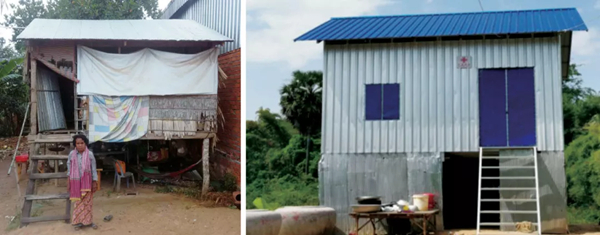Celebrating 100th anniversary of CPC | Building homes and increasing incomes with a helping hand from Chinese experts
Editor's note:
On Nov 13, 2014, at the ASEAN-China-Japan-South Korea (10+3) leaders' meeting, China proposed implementing the Cooperation Initiative on Poverty Reduction in East Asia, carrying out rural poverty reduction promotion programs and establishing the East Asia Poverty Reduction Demonstration Project.
In 2015, the Chinese government decided to cooperate with Cambodia, Laos and Myanmar to carry out technical assistance projects for poverty reduction in East Asia.
In February 2017, a Chinese resident expert group went to work in Chheuteal Phlos and Svay Ampear villages in Svay Ampear commune, Mok Kampoul district, Kandal province, Cambodia.
The group drew on China's successful experience in village promotion and targeted poverty alleviation, adapted to local conditions, and focused on managing poverty-causing factors and meeting development needs in order to plan and design a series of measures such as infrastructure, public services, environmental improvements, livelihood improvements, capacity building and technical assistance in order to lift people in these villages out of poverty.

Maode, a 65-year-old villager in Svay Ampear Village, was afraid of the rain.
His home, with just palm leaves, bamboo and gauze to cover it, was vulnerable to the falling rainwater. Whenever storms struck, all he and his family could do was to gather together and pray.
Maode sometimes imagined a new home: no leaks, no insect bites on his children, and enough room for his chicken to stay inside. He also wanted to grow some peppers so that he could make some money - of course, he knew that this is just a fantasy.
To Maode's surprise, his dream suddenly came true one day in August 2018.
That month, a Chinese expert team from the China-Cambodia Joint Project Management Office (JPMU) of the East Asia Poverty Reduction Demonstration Project came to Maode's home and asked him some questions. They wanted to know what he needed most.
While asking questions and taking notes, the experts made plans for rebuilding his house. They would add a bathroom, electricity for lighting, and drinking water.
Maode felt that hope had finally come.
The $350 he contributed, plus another $830 from JPMU, meant he had enough money for the renovations. On October 25, 2018, his new all-metal house was built. Looking at the bright windows and spacious room, Maode couldn't believe his eyes.
On November 29, a concrete latrine was completed. After another three months, Maode's wife Chenlun lined up with other villagers at their community center to receive a cooker and two stoves.
With housing settled, the group returned in another visit to discuss how to help his family increase their income.
Since Maode's relatives could provide vacant land, the expert group helped Maode plant millet peppers and raise cattle, attend skill training, and arranged for his eldest daughter to work in a water supply project to solve the income problem.
Maode said that many years ago, growing peppers was his dream. Now, his dream has finally become a reality.

Follow us on WeChat
京ICP备18041594号-1
京公网安备 11010202005508号

Follow us on WeChat


